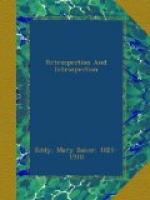Learning was so illumined, that grammar was eclipsed. Etymology was divine history, voicing the idea of God in man’s origin and signification. Syntax was spiritual order and unity. Prosody, the song of angels, and no earthly or inglorious theme.
GIRLHOOD COMPOSITION
From childhood I was a verse-maker. Poetry suited my emotions better than prose. The following is one of my girlhood productions.
ALPHABET AND BAYONET
If fancy plumes aerial flight,
Go fix thy restless
mind
On learning’s lore and
wisdom’s might,
And live to bless
mankind.
The sword is sheathed, ’tis
freedom’s hour,
No despot bears
misrule,
Where knowledge plants the
foot of power
In our God-blessed
free school.
Forth from this fount the
streamlets flow,
That widen in
their course.
Hero and sage arise to show
Science the mighty
source,
And laud the land whose talents
rock
The cradle of
her power,
And wreaths are twined round
Plymouth Rock,
From erudition’s
bower.
Farther than feet of chamois
fall,
Free as the generous
air,
Strains nobler far than clarion
call
Wake freedom’s
welcome, where
Minerva’s silver sandals
still
Are loosed, and
not effete;
Where echoes still my day-dreams
thrill,
Woke by her fancied
feet.
THEOLOGICAL REMINISCENCE
At the age of twelve[A] I was admitted to the Congregational (Trinitarian) Church, my parents having been members of that body for a half-century. In connection with this event, some circumstances are noteworthy. Before this step was taken, the doctrine of unconditional election, or predestination, greatly troubled me; for I was unwilling to be saved, if my brothers and sisters were to be numbered among those who were doomed to perpetual banishment from God. So perturbed was I by the thoughts aroused by this erroneous doctrine, that the family doctor was summoned, and pronounced me stricken with fever.
My father’s relentless theology emphasized belief in a final judgment-day, in the danger of endless punishment, and in a Jehovah merciless towards unbelievers; and of these things he now spoke, hoping to win me from dreaded heresy.
My mother, as she bathed my burning temples, bade me lean on God’s love, which would give me rest, if I went to Him in prayer, as I was wont to do, seeking His guidance. I prayed; and a soft glow of ineffable joy came over me. The fever was gone, and I rose and dressed myself, in a normal condition of health. Mother saw this, and was glad. The physician marvelled; and the “horrible decree” of predestination—as John Calvin rightly called his own tenet—forever lost its power over me.




